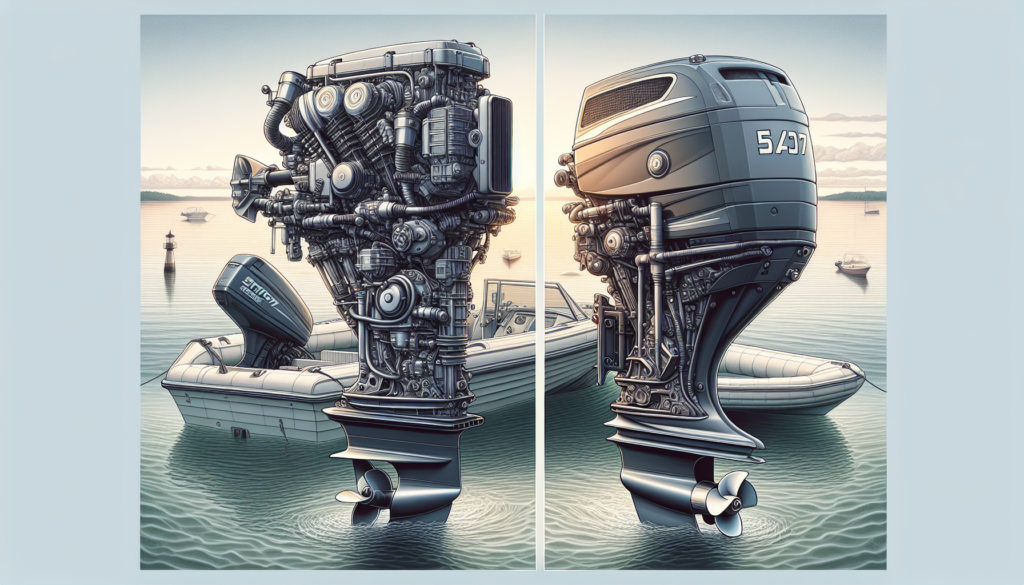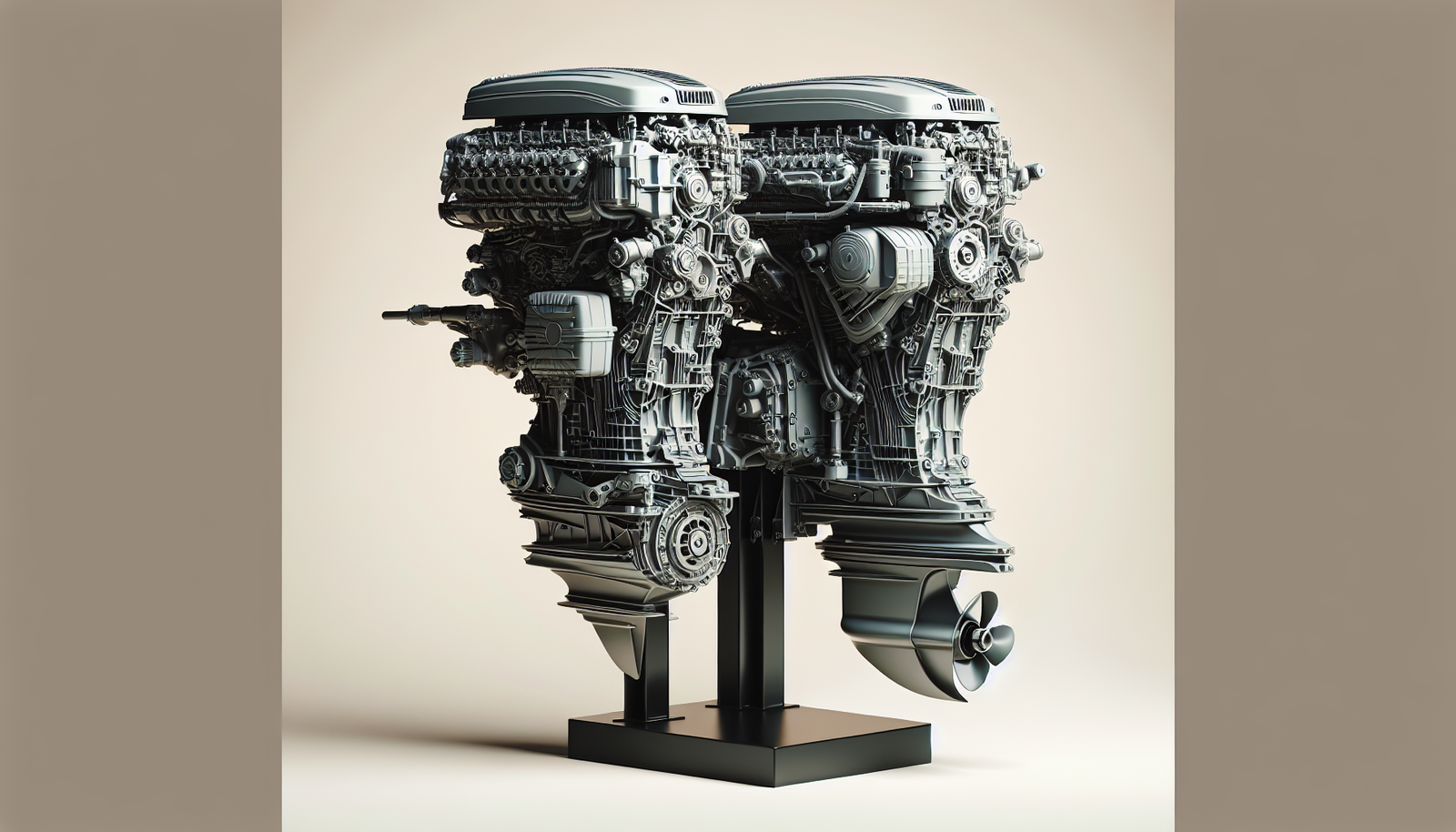If you’re preparing to make a significant investment in a boat, your choice of engine—either outboard or inboard—can have significant ramifications. In “Buyer’s Guide: What to Consider When Choosing an Outboard vs. Inboard Boat Engine,” we’re going to examine the key factors that should guide your decision-making process. From the boat’s intended use and your budget to operational costs and maintenance factors, this guide is designed to help you make an informed decision, ensuring that your boat’s power source matches your nautical needs.
Understanding the Basics of Boat Engines
Boat engines are fundamental components in marine vessels that are responsible for propulsion and handling. There are various types of boat motors, but let’s focus on two common types, the inboard and outboard engines.
Definition of an Inboard Engine
An inboard engine, as the name hints, is mounted permanently within the hull of a boat at the centerline. It is typically encased in a mechanical housing, called the ‘engine box’. The energy produced is transferred to a propulsion system outside the hull, often through a drive shaft that connects to a propeller.
Definition of an Outboard Engine
In contrast, an outboard engine is an integrated motor designed to be mounted at the exterior transom (back end) of a boat. It combines an engine, gearbox, and propeller in one portable device. Notably, due to its placement, outboard engines can be steered to control the direction of the boat directly.
How inboard and outboard engines work
Both inboard and outboard engines serve the purpose of propelling your boat through the water. The inboard engine transfers power to the external propeller through a drive shaft while being cooled by water drawn in from outside the hull. Outboard engines, on the other hand, propel a boat forward by turning a propeller at the end of the unit and are typically cooled by a more straightforward water pump system.
Types of inboard and outboard engines
When it comes to types, inboard boat engines are mainly split into two classes, namely diesel and gasoline. Diesel inboards are valued for their longevity and fuel efficiency, while gas inboards are appreciated for their speed and swift acceleration. Outboard engines, on the other hand, come in a wider variety, including two-stroke, four-stroke and direct fuel-injection systems. Each with their distinct advantages and characteristics.
Differences Between Inboard and Outboard Engines
Seeing that you now grasp the basics, let’s delve further into the differences between the two based on their functionality, power, placement, size, and maintenance.
Functionality Difference
Functionality wise, inboards offer greater maneuverability due to their central position, at the price of operating complication. Outboards, on the other hand, are simpler to operate, deliver easier steering control, and offer the advantage of tilt for shallow waters.
Power Difference
Power or performance in either engine varies based on factors like design and horsepower (HP). In general, inboard engines are more potent and offer a smooth, reliable ride in rough waters. In contrast, outboards are versatile with wide-ranging horsepower options and work best for speed in calmer waters.
Placement and Size Difference
Placement-wise, as mentioned, inboard engines are located inside the hull, contributing to the boat’s balance. They are also typically larger and heavier than outboards, adding to the boat’s total weight. On the opposite, outboard engines are mounted on the stern and are generally smaller and lighter.
Maintenance and Repair Difference
Maintenance and repair-wise, inboard engines are more complex, harder to access, and require professional help more often. In contrast, outboard engines are easier to maintain and repair due to their accessibility.

Benefits of Inboard Engines
Let’s now make sense of the possible reasons why you might prefer an inboard engine for your boat.
Better Handling and Maneuverability
Inboard engines tend to provide better handling and maneuverability, especially at high speeds and in rough waters. This makes them suitable for racing or big game fishing where precision and stability are paramount.
Inboard Engines are Quieter
Undoubted, inboard engines tend to be quieter as the engine’s noise is somewhat absorbed within the boat’s hull. This could be an advantage if peaceful rides are what you’re seeking.
Increased Boat Balance
Inboard engines, due to their central placement, contribute to a boat’s balance, leading to a smoother ride, especially in rougher conditions. Interference from waves and wind is kept minimal due to the lower center of gravity.
More Space for Passengers
As the engine is housed internally, inboard motors leave more room on the deck for passengers or cargo. This could be an advantage if you plan to have large parties on board or need an extensive cargo area.
Drawbacks of Inboard Engines
However, inboard engines have their downsides. Let’s discuss a few.
Higher Initial Costs
Inboard engines tend to be more costly initially due to their size, complexity, and power. This could be a disadvantage if you’re working with a tight budget.
Complex Maintenance and Repair
Because inboard engines are located within the hull, maintenance and repair can be more complex and more costly.
Challenging for Shallow Waters
Inboard boats cannot be tilted the way outboards can. Hence, they may not be as suitable for shallow waters as their outboard counterparts.

Advantages of Outboard Engines
Our discussion wouldn’t be complete without listing a few benefits of outboard engines.
Lower Initial Cost
As outboard engines are less complex and smaller, they tend to cost less initially when compared with inboard engines. This might make them a preferable choice if you’re just getting started with boating or have budget restrictions.
Easier Maintenance
One widely appreciated advantage of an outboard engine is the accessibility it provides for maintenance and repair.
Better for Shallow Waters
The ability to tilt the motor out of the water allows these motors to be more suitable for navigations in shallow waters or around hidden obstacles.
Easy to Replace
Replacing outboard engines is generally easier and cheaper than inboards due to their detachability.
Disadvantages of Outboard Engines
Though outboard engines are deemed versatile, they do display some deficits as well.
Lower Fuel Efficiency
Generally speaking, outboard engines have lower fuel efficiency when compared to their inboard counterparts. This could be a disadvantage if you plan to use your boat frequently or go on long trips.
Less Suitable for Larger Boats
Due to their lower power and mounting on the stern, outboard engines are less suitable for larger, heavier boats. If you need to power a large yacht or a heavy work boat, an inboard engine would probably be a better choice.
Lack of Interior Space
Since outboard engines are mounted externally, they reduce the available space on the boat’s stern, which could be a problem if you need to store a lot of equipment or want more space for passengers.

Selecting the Right Engine Based on Boat Type
Your choice between an inboard and an outboard engine should further depend on the type of boat you have or plan to buy.
Engine Considerations for Fishing Boats
If you plan to go deep-sea fishing, an inboard engine might be preferable as it provides a smoother, more stable ride. On the other hand, if you will be fishing mostly in inshore or shallow waters, an outboard engine might be a better choice.
Engine Considerations for Speed Boats
For speed boats, outboard engines are often the preference due to their high speeds and easy maneuverability. Inboard engines, on the other hand, may give you an edge in performance, control, and durability in challenging conditions.
Engine Considerations for Pontoon Boats
For pontoon boats, the choice greatly depends on the use. Outboard engines are commonly chosen for their efficiency, but for high-end models typically used for entertainment or sporting, an inboard engine might be more suitable.
Engine Considerations for Cabin Cruisers
Cabin cruisers often run better with inboard engines due to their size and need for a smooth, powerful ride. Also, inboard engines provide extra interior space for your living quarters in cabin cruisers.
Understanding the Costs Involved
Your decision should not be exclusively about engine type but also about the entire cost picture associated with your preferred choice.
Breakdown of Initial Purchase Costs
Outboard engines are generally more affordable than inboards. However, the cost can vary depending on the brand, features, and horsepower of the engine.
Costs of Maintenance
As already mentioned, inboard engines require more complex and regular maintenance than outboards, which could raise their operating costs over time.
Fuel Efficiency Costs
Always remember that even though an outboard engine might be cheaper in the beginning, its fuel efficiency is usually lower. This means you’ll probably spend more on fuel over the long run.

Considering Environmental Impact
Taking the ‘greener’ approach to boating has gained importance recently.
Emission Standards for Boat Engines
Both inboard and outboard engines have improved significantly over the years to meet environmental standards. However, newer models of outboard engines have made substantial strides in reducing emissions.
Fuel Efficiency and Environmental Impact
While inboard engines tend to be more fuel-efficient than outboard engines, the type of fuel an engine uses (diesel vs. gasoline) also impacts its environmental footprint.
Making the Final Decision
Now that we’ve walked through several parameters, here’s how to make the final call.
Assessing Your Personal Needs and Preferences
Consider what you value most in a boat engine – speed, maneuverability, low noise levels, fuel economy, ease of maintenance, cost, environmental impact, or other factors. That way, you’ll be able to make a decision that aligns with your personal needs.
Importance of Test Drives
If you’re still finding it hard to decide, why not test drive boats with both types of engines? That could give you a first-hand experience of what it’s like to operate each engine type and help you decide which one you prefer.
Consulting with Marine Professionals
Finally, if you have further questions or need more advice, consider consulting with marine professionals. They can help you make an informed decision based on your specific needs, preferences, and budget.
Selecting the right boat engine is a crucial factor in enjoying your marine adventures. So whether you go for an inboard or an outboard engine, make sure it aligns with your requirements and expectations. Happy Boating!

